Nourhan Sakr
Improving Mixed-Criticality Scheduling with Reinforcement Learning
Apr 08, 2025



Abstract:This paper introduces a novel reinforcement learning (RL) approach to scheduling mixed-criticality (MC) systems on processors with varying speeds. Building upon the foundation laid by [1], we extend their work to address the non-preemptive scheduling problem, which is known to be NP-hard. By modeling this scheduling challenge as a Markov Decision Process (MDP), we develop an RL agent capable of generating near-optimal schedules for real-time MC systems. Our RL-based scheduler prioritizes high-critical tasks while maintaining overall system performance. Through extensive experiments, we demonstrate the scalability and effectiveness of our approach. The RL scheduler significantly improves task completion rates, achieving around 80% overall and 85% for high-criticality tasks across 100,000 instances of synthetic data and real data under varying system conditions. Moreover, under stable conditions without degradation, the scheduler achieves 94% overall task completion and 93% for high-criticality tasks. These results highlight the potential of RL-based schedulers in real-time and safety-critical applications, offering substantial improvements in handling complex and dynamic scheduling scenarios.
Government Intervention in Catastrophe Insurance Markets: A Reinforcement Learning Approach
Jul 03, 2022



Abstract:This paper designs a sequential repeated game of a micro-founded society with three types of agents: individuals, insurers, and a government. Nascent to economics literature, we use Reinforcement Learning (RL), closely related to multi-armed bandit problems, to learn the welfare impact of a set of proposed policy interventions per $1 spent on them. The paper rigorously discusses the desirability of the proposed interventions by comparing them against each other on a case-by-case basis. The paper provides a framework for algorithmic policy evaluation using calibrated theoretical models which can assist in feasibility studies.
Spatio-Temporal Attention Mechanism and Knowledge Distillation for Lip Reading
Aug 07, 2021



Abstract:Despite the advancement in the domain of audio and audio-visual speech recognition, visual speech recognition systems are still quite under-explored due to the visual ambiguity of some phonemes. In this work, we propose a new lip-reading model that combines three contributions. First, the model front-end adopts a spatio-temporal attention mechanism to help extract the informative data from the input visual frames. Second, the model back-end utilizes a sequence-level and frame-level Knowledge Distillation (KD) techniques that allow leveraging audio data during the visual model training. Third, a data preprocessing pipeline is adopted that includes facial landmarks detection-based lip-alignment. On LRW lip-reading dataset benchmark, a noticeable accuracy improvement is demonstrated; the spatio-temporal attention, Knowledge Distillation, and lip-alignment contributions achieved 88.43%, 88.64%, and 88.37% respectively.
EduPal leaves no professor behind: Supporting faculty via a peer-powered recommender system
Apr 20, 2021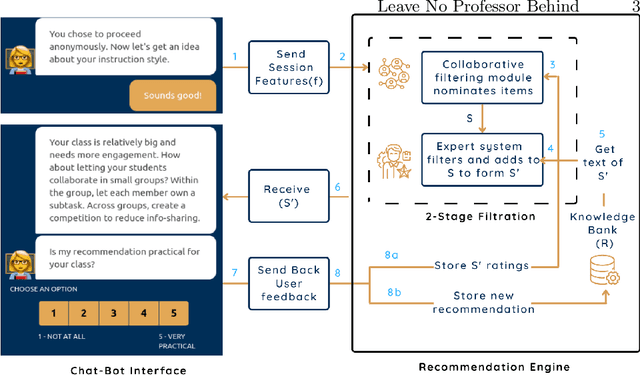
Abstract:The swift transitions in higher education after the COVID-19 outbreak identified a gap in the pedagogical support available to faculty. We propose a smart, knowledge-based chatbot that addresses issues of knowledge distillation and provides faculty with personalized recommendations. Our collaborative system crowdsources useful pedagogical practices and continuously filters recommendations based on theory and user feedback, thus enhancing the experiences of subsequent peers. We build a prototype for our local STEM faculty as a proof concept and receive favorable feedback that encourages us to extend our development and outreach, especially to underresourced faculty.
Few Shot System Identification for Reinforcement Learning
Mar 30, 2021
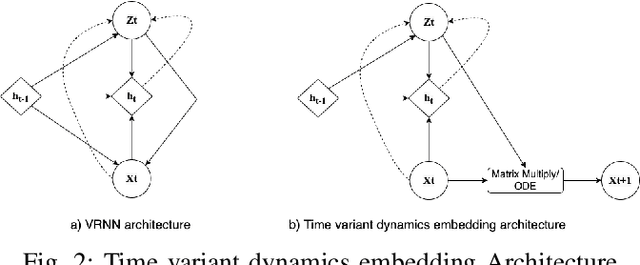
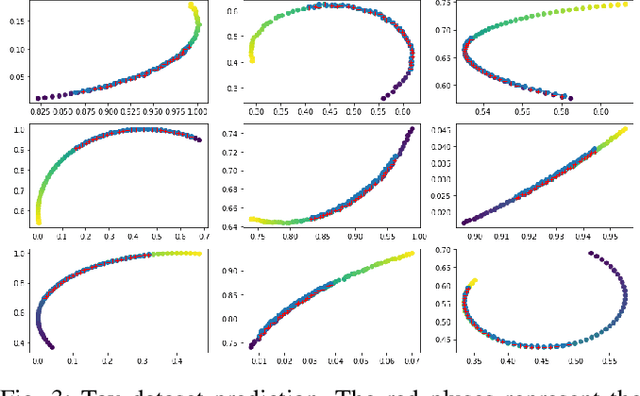
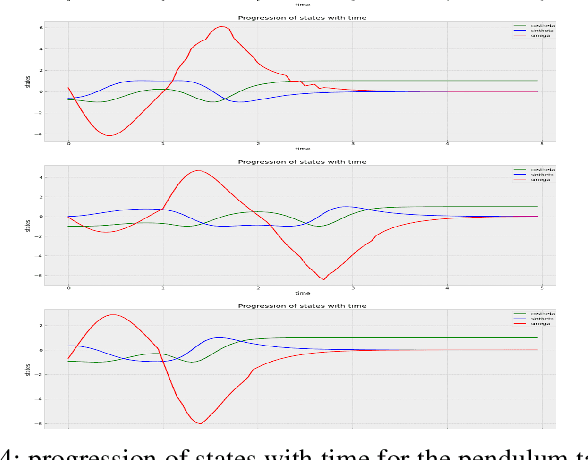
Abstract:Learning by interaction is the key to skill acquisition for most living organisms, which is formally called Reinforcement Learning (RL). RL is efficient in finding optimal policies for endowing complex systems with sophisticated behavior. All paradigms of RL utilize a system model for finding the optimal policy. Modeling dynamics can be done by formulating a mathematical model or system identification. Dynamic models are usually exposed to aleatoric and epistemic uncertainties that can divert the model from the one acquired and cause the RL algorithm to exhibit erroneous behavior. Accordingly, the RL process sensitive to operating conditions and changes in model parameters and lose its generality. To address these problems, Intensive system identification for modeling purposes is needed for each system even if the model dynamics structure is the same, as the slight deviation in the model parameters can render the model useless in RL. The existence of an oracle that can adaptively predict the rest of the trajectory regardless of the uncertainties can help resolve the issue. The target of this work is to present a framework for facilitating the system identification of different instances of the same dynamics class by learning a probability distribution of the dynamics conditioned on observed data with variational inference and show its reliability in robustly solving different instances of control problems with the same model in model-based RL with maximum sample efficiency.
Structured adaptive and random spinners for fast machine learning computations
Nov 26, 2016
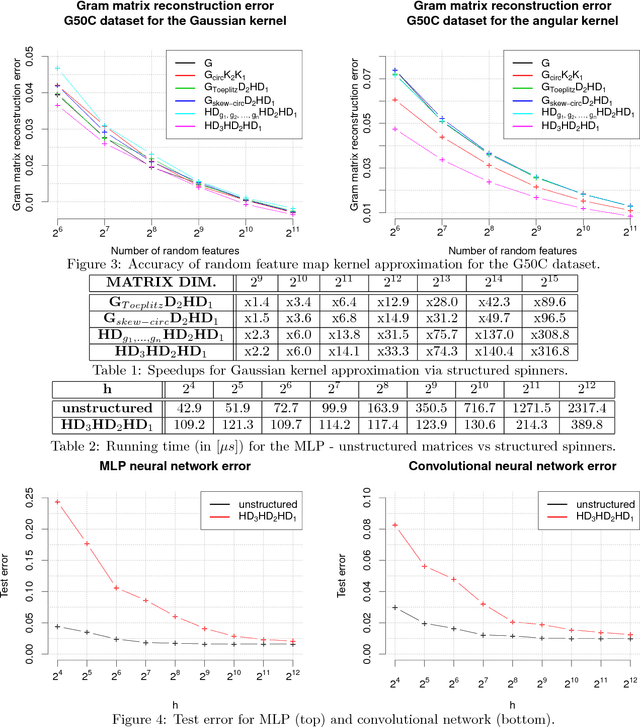
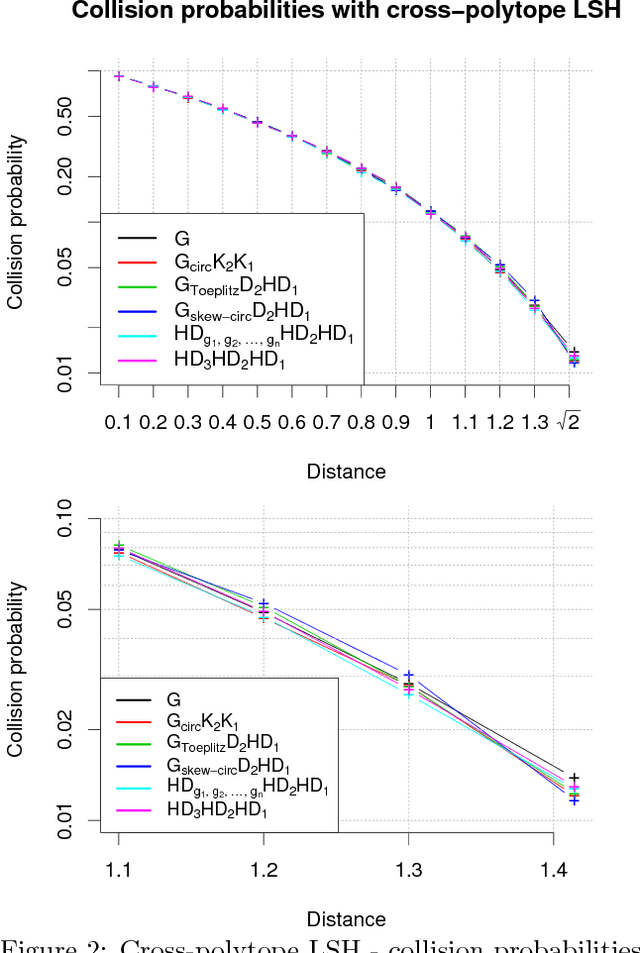
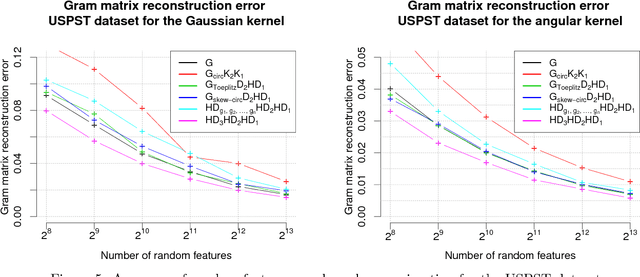
Abstract:We consider an efficient computational framework for speeding up several machine learning algorithms with almost no loss of accuracy. The proposed framework relies on projections via structured matrices that we call Structured Spinners, which are formed as products of three structured matrix-blocks that incorporate rotations. The approach is highly generic, i.e. i) structured matrices under consideration can either be fully-randomized or learned, ii) our structured family contains as special cases all previously considered structured schemes, iii) the setting extends to the non-linear case where the projections are followed by non-linear functions, and iv) the method finds numerous applications including kernel approximations via random feature maps, dimensionality reduction algorithms, new fast cross-polytope LSH techniques, deep learning, convex optimization algorithms via Newton sketches, quantization with random projection trees, and more. The proposed framework comes with theoretical guarantees characterizing the capacity of the structured model in reference to its unstructured counterpart and is based on a general theoretical principle that we describe in the paper. As a consequence of our theoretical analysis, we provide the first theoretical guarantees for one of the most efficient existing LSH algorithms based on the HD3HD2HD1 structured matrix [Andoni et al., 2015]. The exhaustive experimental evaluation confirms the accuracy and efficiency of structured spinners for a variety of different applications.
 Add to Chrome
Add to Chrome Add to Firefox
Add to Firefox Add to Edge
Add to Edge